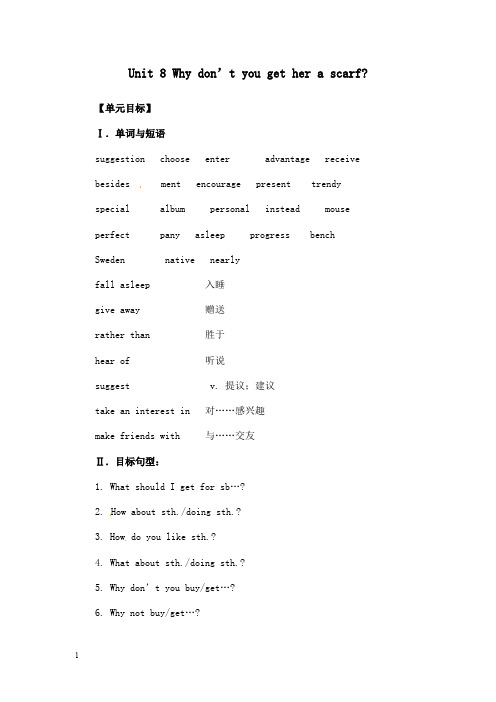【最新】鲁教版八年级英语上册Unit 8 【Period 5 Section B (2a-self check) 】导学案
- 格式:doc
- 大小:126.00 KB
- 文档页数:8

Unit 8 I've had this bike for three years.【第一学时】【学习目标】1.知识目标词汇:among, search, especially等。
2.学习讨论自己的家乡并写成文章。
3.能力目标:能够和同学讨论自己的家乡并写出家乡的变化。
4.情感目标:通过讨论自己家乡的变化,培养学生对自己家乡的热爱之情。
培养学生善于观察,乐于分享和交流的思想感情。
【学习重难点】1.熟记本课时词汇和句型。
2.能将本课时话题用于实际交流中。
【学习过程】要点精讲1.among prep.在(其)中,……之一辨析:between与among的区别between介词,意为“在……之间”,一般指在两者之间,常与and连用。
among介词,意为“在……之间”,一般用于三者或三者以上的人或物之间。
Our teacher is standing among the students.我们的老师站在学生中间。
活学活用:The old woman lives ______ a small village. It is ______ two hills.A.in, among B.at, among C.at, between D.in, between 2.regard v.将……认为,把……看作。
点拨:regard…as…把……看做……,将……认为……例如:He regards me as his son.他将我视为他的儿子。
活学活用:The American teacher regards us ______ his friends.A.as B.to C.with D.\3.consider v.注视,仔细考虑。
点拨:consider doing sth.仔细考虑做某事=think about doing sth.;consider…a s…把……视为……=regard…as…例如:Please consider coming and joining us.请考虑来加入我们。


Unit 8 Why don’t you get her a scarf? 【单元目标】Ⅰ.单词与短语suggestion choose enter advantage receive besides ment encourage present trendy special album personal instead mouse perfect pany asleep progress bench Sweden native nearlyfall asleep 入睡give away 赠送rather than 胜于hear of 听说suggest v. 提议;建议take an interest in 对……感兴趣make friends with 与……交友Ⅱ.目标句型:1. What should I get for sb…?2. How about sth./doing sth.?3. How do you like sth.?4. What about sth./doing sth.?5. Why don’t you buy/get…?6. Why not buy/get…?7. They’re too expensive/cheap/personal…8. Great!/Good idea!/OK…. I’ll get/buy…9. My best gift is…10. It’s good for sb. to…11. It can make sb….Ⅲ.重点句型1. Why don’t sb. do sth.?2. How about结构3. too…to结构【重难点分析】1. Why don’t you do sth.?这是给别人提建议,建议某人做什么事情的句型。
如:Why don't we e more often? 咱们为什么不经常来这里呢?'Why don’t you buy a book for your father? 给你爸爸买本书怎么样?这个句子还可以写成Why not do…?如:Why not get her a camera? 为什么不给她买个相机呢?这个句型还有发出礼貌地邀请的用法。


鲁教版英语八上Unit 8 I’ve had this bike for three years Section B 1a-2d 教学设计一. 教材分析鲁教版英语八上Unit 8的主题是关于描述拥有某物的时间长短,通过本节课的学习,学生能够掌握一般现在时态的肯定句和否定句,以及表示拥有某物的句型。
Section B 1a-2d部分主要通过一个关于学生拥有物品的调查活动,引出一般现在时态的肯定句和否定句,并通过对话和阅读材料来巩固和拓展这个语法点。
二. 学情分析考虑到学生已经掌握了祈使句和一般现在时态的简单句型,他们在学习本节课的内容时会有一个已知的基础。
然而,对于一些学生来说,理解和运用一般现在时态的否定句可能会有一定的难度。
因此,在教学过程中,需要关注这部分学生的学习情况,并通过适当的辅导和练习来帮助他们理解和掌握。
三. 教学目标1.学生能够理解和运用一般现在时态的肯定句和否定句。
2.学生能够通过阅读和对话,运用一般现在时态来描述自己和他人的拥有物品。
3.学生能够通过调查活动,提高自己的合作和交流能力。
四. 教学重难点1.重点:一般现在时态的肯定句和否定句的构成和运用。
2.难点:一般现在时态的否定句的理解和运用。
五. 教学方法1.任务型教学法:通过调查活动,让学生在实际操作中学习和运用语言。
2.交际型教学法:通过角色扮演和小组讨论,让学生在真实的语境中运用语言。
3.直接法:通过直观的教具和图片,让学生直接理解和记忆语言点。
六. 教学准备1.调查表:用于学生进行调查活动。
2.图片:用于展示和描述拥有的物品。
3.对话和阅读材料:用于巩固和拓展语言点。
七. 教学过程1.导入(5分钟)通过提问学生他们拥有的物品,引起学生对主题的兴趣。
同时,引导学生思考如何用英语来描述这些物品。
2.呈现(10分钟)通过展示图片和调查表,呈现一般现在时态的肯定句和否定句的构成。
让学生观察和模仿,然后进行实际操作,用英语来描述自己的物品。

Unit 8 I've had this bike for three years.【第二课时】【教学目标】1.知识目标:掌握现在完成时的用法。
2.能力目标:(1)正确区分现在完成时与一般过去时。
(2)正确运用for和since的用法。
3.情感目标:正确处理并充分利用自己的废旧物品。
【教学重难点】1.正确区分现在完成时与一般过去时。
2.正确运用for和since的用法。
【教学过程】Step 1 Group work.出示下面的典型例句,让学生们先自己观察句子结构,对比现在完成时和一般过去时的不同。
1.— How long have you had that bike over there? 那边的那辆自行车你买了多长时间了?— I've had it for three years. 我买了三年了。
2.How long has his son owned the train and railway set? 他的儿子拥有这套轨道火车多长时间了?He's owned it since his fourth birthday. 自他四岁生日起,他就拥有了它。
3.Have you ever played football? 你曾经踢过足球吗?Yes, I did when I was little, but I haven't played for a while now.是的,当我很小时就踢过,但是现在我有好长一段时间没有踢了。
Step 2 精讲点拨。
1.现在完成时。
表示从过去已经开始持续到现在的动作或状态,可以和表示“从过去某一时刻延续到现在的一段时间状语”连用,如“for + 时间段”、“since + 过去时间点”、“since + 过去时的从句”、“since + 一段时间+ ago”,且for与since引导的时间状语可以相互转换。
e.g.: My uncle has worked at this factory for ten years.= My uncle has worked at this factory since ten year ago.I've lived here since 1990.自从1990年以来我就住在这里。
Unit 8 I’ve had this bike for three years 【Period 5 Section B (2a-self check) 】导学案1、掌握以下词汇:nowadays, search, among, crayon, shame, regard, count, century, according to , opposite, especially, childhood, consider, close to , hold, in one’s time,2、学会用已知信息猜测课文内容。
【学习重点与考点】学会用已知信息猜测课文内容。
【课前自学指导】(一)翻译词组:1、数百万__________________2、家乡情_____________________3、一年一到两次_________________4、寻找工作_____________________5、在过去的13年________________6、20世纪中期_____________________7、一成不变________________ 8、依据、按照__________________ 9、学校对面___________________ 10、一个标志_______________________11、一个快乐的童年______________________12、在我们心里,我们的家乡已留下很多温馨甜美的回忆。
_________________________________________________________________ __13、在我那个年代________________________(二)知识链接1. Nowadays, millions of Chinese leave the countryside to search for work in the cities.Search用作不及物动词时,意为“搜索;搜查”。
短语search for 意为“搜寻,找寻”。
e.g. He is searching for his sunglasses. 他正在找他的太阳镜。
【拓展】作及物动词,意为“在••••••搜查”或“搜查”。
e.g. They searched the forest for the lost child.他们在森林里寻找那个走失的小孩。
2. Among these is Zhang Wei, a 46-year-old husband and father among 在三者或三者以上之间。
e.g. Tom sits among the students. 汤姆坐在学生之间。
between 在两者之间e.g. Tom sits between Mary and Frank. 汤姆坐在玛丽和弗兰克之间。
a 46-year-old husband and father意为“一位46岁的丈夫和父亲”,相当于a husband and father of 46y ears old.four-year-old 是一个复合形容词,特点“一是数词、名词、形容词之间要用连字符连接,二是数词后的名词用单数形式。
e.g. Tom is a 10-year-old boy.= Tom is a boy of 10 years old. 汤姆是一个10岁的男孩。
Lily is an 8-year-old girl. 莉莉是一个8岁的女孩【拓展】另一种类似的复合形容词作定语的结构是:数词+连字符+名词,或数词+名词的所有格。
e.g. a two-month holiday=a two months’ holiday 一个为期两个月的假期。
Ten-minute walk/drive/ride=ten minutes’ walk/drive/ride 步行/开车/骑车10分钟的路程3…It’s a shame, but I just don’t have the time,…shame 不可数名词,意为“羞耻;羞愧;惭愧” 与a连用,表示“可耻的人或事;可惜(遗憾)的事”。
e.g. He felt no shame for what he had done. 他对自己所做过的事不感到羞愧。
It’s a shame (that) you can’t stay for dinner. 你不能留下来吃晚饭,真遗憾。
【拓展】相关短语:to one’s shame 令人感到羞愧的是feel shame at …因••••••而感到羞愧in shame 羞愧的have no shame无羞耻心4. Many people like Zhong Wei regard with great interest how thei r hometowns have changed.regard 及物动词,意为“将••••••认为;把••••••视为”。
常用短语regard…as…意为“将••••••视为••••••;把••••••当做••••••”,as 为介词,其后接名词或代词。
e.g. I regard you as my best friend. 我把你当做我最好的朋友。
We regard him as our brother. 我们把他当成兄弟看待。
5. Children have learned to read and count at my old primary school since the mid-20th century.century可数名词,意为“世纪;百年”,其复数形式为centuries。
e.g. The mid-20th century 意为“20世纪中期”eighteenth-century writer 18世纪的作家。
A hundred years is a century. 一百年是一个世纪。
6. According to Zhong Wei, however, some things will never change. according to 意为“依照,按照”,to为介词,后接名词、代词或从句e.g. He divided them into three groups according to age. 他把他们按年龄分成三组。
7. Most of the chi ldren in my time liked to play together under that big tree, especially during the summer holidays.especially 副词,意为“尤其;特别;格外”,在句中作状语,用于列举某个特例或某事物的特殊性。
形容词为especial“特别的,特殊的”。
e.g. Flowers are always welcomed, especially in winter. 鲜花总是受到欢迎,尤其是冬天。
8. consider 动词,意为“考虑”,=think about,后跟名词,代词,动名词,宾语从句或“疑问词+不定式”。
e.g. Please consider my suggestion. 请考虑我的建议。
I am considering changing my job.我正在考虑换份工作。
He has never considered how to solve the problem他从未考虑过如何解决那个问题。
【拓展】在与动词连用时,只能用动名词形式的动词或短语有:consider “考虑” enjoy “喜爱”practice“练习” keep (on)“继续(一直)”m ind “介意” finish“完成”have fun “高兴” feel like “想要”look fo rward to “盼望” can’t help “禁不住”give up “放弃”歌诀:喜欢错过别介意,完成愉快勤练习,禁不住考虑想放弃9. in my opinionin one’s opinion=in the opinion of sb. 意为“依••••••看”。
e.g. In my opinion, it’s best to make some cards for our teachers.依我看,最好给我们的老师做些卡片。
10. holdhold及物动词,意为“拥有;抓住”,过去式和过去分词均为helde.g. He holds a major share in the company. 他持有该公司的大部分股份。
He is holding a book in her hand. 她手里正拿着一本书。
【拓展】hold用作及物动词,还可意为“举行;主持”,相当于havee.g. They will hold a meeting to discuss this problem tomorrow.【学习过程】(一)导入并出示学习目标(二)自主学习情况交流在组内讨论交流预习中遇到的困难或存在的问题。
(老师点拨,师生互探讨)(三)合作探究:1.组长带领组员找出课本P79的重要短语、句子。
2.组长带领组员熟读2a课文,并挑选课堂展示人选。
3.多组合作展示2b、2c的答案。
(四)总结,今天我们学习了_____________________________(五)课堂检测用所给词的适当形式填空( )1. —Jackie Chan has donated ______ dollars to charity.—He is an example to us all.A. thousandB. thousandsC. thousand ofD. thousands of ( )2. --Can you give me some information about vacation trips?-- Why not _________ going to Hain an Island?A. considerB. mindC. keepD. think( )3. --Did you go to Kenli during the Peach Blossom Festival (桃花节)?--Yes. The flowers were beautiful. Bees were flying _________them.A. inB. amongC. betweenD. through( )4. Nowadays millions of Chinese leave the countryside to____ for the work in cities.A. lookedB. searchC. findD. see( )5. Mr. Jack ______ China for several years.A. has been toB. has come toC. has been inD. came to ( )6、Do you miss your parents far away?Yes, very much. They ________ the hometown since two years ago..A. left B .have left C. were away from D.have been away from( )7、Hurry up! The film ________ for fifteen minutes..A. beginB. has begunC. is beginningD. has been on ( )8、She ____________this book since she bought it from the bookstore.. A. has borrowed B. has lent C. has bought D. has kept ( )9、Mr Fan __________this watch in 2005. He ________ it for 8 years.. A. bought; has had B. bought; hasC. has bought; has hadD.has bought; had( )10、Some students in Shanghai ___________ e-bags for several months.A. haveB. have hadC. hadD. will have【课后作业】1、复习并总结第二单元的重点短语及句型;2、完成节节练。